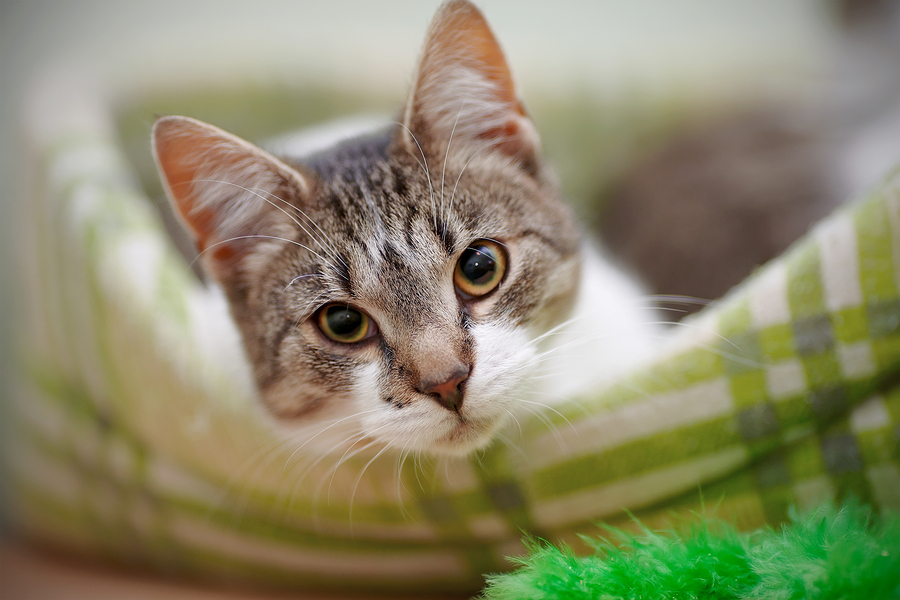
What is the single most important question to ask at every feline office appointment? I imagine that you may have several, depending on the circumstances or maybe on your experiences. But I think there is one question that needs to be asked at every non-emergency (or euthanasia) appointment.
Let’s run a sad but familiar scenario. Susan comes in with her cat, Mouser. She is upset because Mouser has been urinating in the house and both she, and her partner Brian, have had enough of it. She is angry at Mouser and doesn’t understand why he is doing this. Is he is punishing them? They give him a good and loving home, he gets fed good food….Susan is frustrated and angry. She resents being put into a situation where she has to choose peace and harmony and a nice home over her cat. But, here she is, and she sees her only option as “getting rid of” Mouser.
You ask when she first noticed Mouser peeing in the house and she tells you that it was about eight or so months ago. “How often is he peeing inappropriately?” “Several times a week,” she says, “with it happening more often lately.” You find out that the problem is mostly manifested as spraying rather than horizontal voiding. “What was the final straw, the point that pushed you over the edge with this,” you ask and she replies that his spraying on her partner’s vinyl records and peeing on his sports bag last night did them in. She figures it was about the 71st time he had sprayed.
[tweetthis]What is the single most important question to ask at every feline office appointment?[/tweetthis]
After this, you perform a physical exam, collect urine for a urinalysis and give Susan’s family a “time out” from Mouser by boarding him at the clinic while you try to ascertain if there is a physical cause before addressing stressors in the home that may be the source for Mouser’s anxiety. But sometimes, it is too late for the clients to allow the perpetrator back into the home: the bond has been broken.
Shelters work hard to find forever homes. We want to help keep these cats IN their homes, rather than have them bounce back to the shelter or be killed. The statistics for surrender to shelter for behavior problems are sobering, especially when we, as members of the cat’s healthcare team, can prevent it.

So let’s replay this scenario. When did this problem start? At least eight months ago, possibly longer given the fickleness of human memory and their lack of concern at that time. Since then, there was some level of spraying that the client was able to cope and live with. It helps to identify what that allowable frequency is, because we can’t guarantee that we can eliminate the behavior completely. We can address stressors and unmet needs (see AAFP and ISFM Feline Environmental Needs Guidelines), we can consider pharmacological and pheromonal therapy, and, with an engaged family and clinic team, there will generally be a happy ending.
[tweetthis]The statistics for surrender to shelter are sobering, especially when we can prevent it.[/tweetthis]
But did it ever have to go this far?
What if, at every visit, we asked one simple question: “Has your cat urinated or defecated somewhere in the house other than in the litter box?” If we ask this question as part of every visit, we can pick up the problem before it becomes a problem … for the clients. We can pick it up on the first or 4th or 15th or 70th occasion, rather than on the 71st when it has tipped the scale of tolerance.
Cats do not spray out of spite. There is always a reason. It may be medical (idiopathic cystitis, arthritis, diabetes, etc.), or it may be a manifestation of distress due to unmet needs that the client isn’t aware of. (See AAFP and ISFM Guidelines
for Diagnosing and Solving House-Soiling Behavior in Cats)
All of this needs to be discussed and carefully evaluated, but you have a better chance of helping Mouser, before the client’s fuse has burnt out.
So let’s do it. Let’s start making this question part of every visit: “Has your cat urinated or defecated somewhere in the house other than in the litter box?” I’ll bet we can save lives and improve happiness.
[tweetthis]Cats do not spray out of spite. There is always a reason.[/tweetthis]
The views and opinions expressed in this article are those of the author and do not necessarily reflect the position of the DrAndyRoark.com editorial team.
 Margie Scherk graduated from the Ontario Veterinary College in 1982. In 1986 she opened Cats Only Veterinary Clinic in Vancouver, practicing there until 2008 when she retired from regular practice. While in practice, she published several clinical trials, including the first paper on transdermal fentanyl patch in veterinary medicine. She has written many book chapters, co-edits the Journal of Feline Medicine and Surgery, has served extensively on committees with the AAFP, North American Vet Licensing, Winn Feline Foundation, WSAVA and ABVP. She is a Paw Project advocate, hoping to end declawing in Canada. She continues to assist colleagues with case management and enjoys teaching about all things feline, including improving interacting with cats, analgesia, nutrition, gastroenterology and kidney disease.
Margie Scherk graduated from the Ontario Veterinary College in 1982. In 1986 she opened Cats Only Veterinary Clinic in Vancouver, practicing there until 2008 when she retired from regular practice. While in practice, she published several clinical trials, including the first paper on transdermal fentanyl patch in veterinary medicine. She has written many book chapters, co-edits the Journal of Feline Medicine and Surgery, has served extensively on committees with the AAFP, North American Vet Licensing, Winn Feline Foundation, WSAVA and ABVP. She is a Paw Project advocate, hoping to end declawing in Canada. She continues to assist colleagues with case management and enjoys teaching about all things feline, including improving interacting with cats, analgesia, nutrition, gastroenterology and kidney disease.